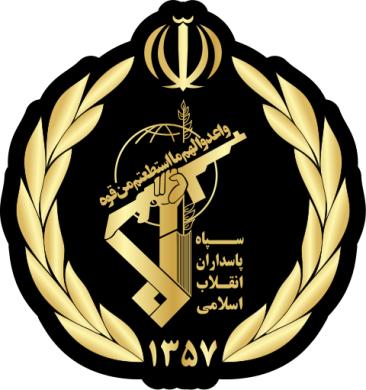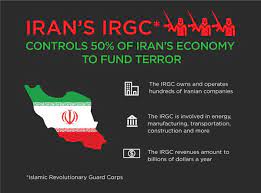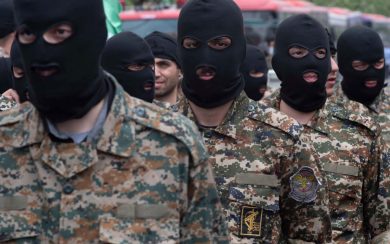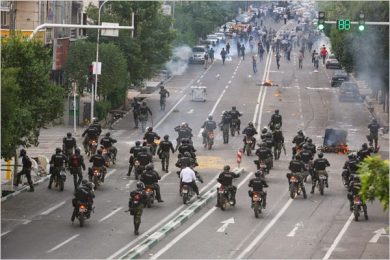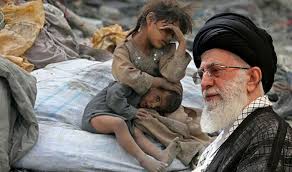The Islamic Revolutionary Guard Corps (IRGC) wields an extensive propaganda machine designed to control public perception, suppress dissent, and uphold the regime’s dominance in Iran. Through state-controlled media, disinformation campaigns, digital censorship, and psychological warfare, the IRGC manipulates narratives to maintain its authority and discredit opposition movements. This report examines the tactics, channels, and impact of the IRGC’s propaganda efforts, exposing how the regime manufactures consent while silencing independent voices.
1. The IRGC’s Control Over Media and Information Flow
The IRGC exerts direct control over Iran’s media landscape, ensuring that news and narratives align with the regime’s political interests.
A. State-Run Media Domination
• Islamic Republic of Iran Broadcasting (IRIB): The IRGC influences IRIB, Iran’s largest state-controlled media organization, which oversees all radio and television stations.
• News Agencies: Outlets like Tasnim News and Fars News are IRGC-affiliated, spreading pro-regime narratives and discrediting opposition.
• Scripted Reporting: Journalists must adhere to pre-approved narratives, ensuring coverage aligns with government-approved messaging.
B. Banning Independent Media
• Censorship of Newspapers: Independent and reformist newspapers are regularly shut down or heavily censored.
• Targeting Journalists: Reporters critical of the regime face harassment, arrests, and imprisonment under false charges like “acting against national security.”
C. Controlling Foreign News Access
• Blocking International News: The IRGC prevents access to foreign news outlets, banning services like BBC Persian, Voice of America, and Radio Farda.
• Satellite Jamming: The regime disrupts satellite signals to prevent Iranians from watching international broadcasts.
2. The Role of Digital Censorship and Cyber Propaganda
The IRGC leverages cyber warfare and internet restrictions to control narratives in the digital space.
A. Internet Censorship and Surveillance
• Restricted Websites: Thousands of websites, including news platforms and human rights organizations, are blocked.
• Social Media Bans: Twitter, Facebook, and Telegram are restricted to prevent opposition coordination.
• Internet Blackouts: During protests, the IRGC enforces nationwide internet shutdowns to stop the spread of anti-regime content.
B. Cyber Propaganda and Disinformation
• Fake Social Media Accounts: The IRGC deploys bot armies to spread false narratives and attack activists online.
• Manipulated Hashtags: State-sponsored accounts flood social media with pro-regime messaging, drowning out opposition hashtags.
• Troll Farms: Paid operatives spread disinformation, attacking activists and opposition groups as “Western agents.”
C. Hacking and Cyber Attacks
• Surveillance of Dissidents: Activists’ social media and messaging apps are infiltrated by IRGC cyber units.
• Phishing Attacks: Journalists and reformists receive fake emails containing spyware to track their online activity.
3. Psychological Warfare and Indoctrination Tactics
Beyond direct censorship, the IRGC engages in psychological operations to manipulate public perception and foster loyalty to the regime.
A. Indoctrination Through Education
• School Curriculum Control: Textbooks promote anti-Western narratives and glorify the IRGC’s role in protecting Iran.
• University Crackdowns: Student activists are frequently expelled or arrested for opposing regime policies.
B. Propaganda in Cultural Productions
• Pro-Government Films and TV Shows: State-sponsored films depict the IRGC as defenders of the nation, while opposition figures are portrayed as traitors.
• State-Controlled Music and Arts: Cultural productions are censored to align with Islamic Revolutionary values.
C. Manufactured Patriotism
• Martyr Propaganda: The regime glorifies IRGC fighters, particularly those killed in conflicts like Syria, as “defenders of Islam.”
• Nationalist Messaging: Opposition is framed as a threat to Iranian sovereignty, accusing activists of working for Western intelligence agencies.
4. Targeting Opposition Movements and Protesters
The IRGC aggressively discredits and destabilizes opposition groups to maintain control.
A. Branding Protesters as Foreign Agents
• Protests Blamed on Foreign Powers: The regime accuses protesters of being funded by the U.S., Israel, or Saudi Arabia.
• Demonizing Women’s Rights Movements: Activists in the Women, Life, Freedom movement are labeled as “Western puppets”.
B. Misinformation About Political Prisoners
• Forced Confessions: Arrested activists are coerced into making televised confessions, admitting to fabricated crimes.
• Framing Activists as Terrorists: Prominent opposition leaders are falsely accused of ties to terrorist groups to justify their imprisonment.
C. Disrupting Protests with False Narratives
• Fake Protest Accounts: Government operatives infiltrate activist circles, spreading confusing messages to divide movements.
• State-Backed Counter-Protests: The IRGC organizes pro-government rallies to create the illusion of mass public support.
5. The Global Response to IRGC Propaganda
Despite the IRGC’s efforts to control public perception, international organizations and activists continue to expose its propaganda.
A. Independent Journalism and Exiled Media
• Persian-language media outlets like BBC Persian, Iran International, and Radio Farda provide uncensored reporting on Iran.
• Exiled Iranian journalists play a key role in debunking government propaganda.
B. Social Media Resistance
• Activists and citizen journalists use VPNs and encrypted platforms to bypass censorship.
• Hashtag campaigns like #MahsaAmini and #WomenLifeFreedom have exposed human rights abuses despite state repression.
C. Sanctions on State-Controlled Media
• The United States and European Union have sanctioned IRGC-controlled media networks, limiting their global influence.
• Efforts continue to hold IRGC-affiliated journalists and cyber operatives accountable for spreading disinformation.
6. Recommendations for Countering IRGC Propaganda
A. Strengthening Digital Resistance
• Expanding access to VPN services, satellite internet, and secure messaging platforms can help Iranians bypass censorship.
B. Supporting Independent Media
• Funding for Persian-language independent journalism is crucial to counter IRGC disinformation.
C. Holding the IRGC Accountable
• Governments should impose harsher sanctions on IRGC-controlled media and cyber operatives responsible for suppressing free speech.
Conclusion
The IRGC’s propaganda machine is one of its most powerful tools for maintaining control over Iran. Through media manipulation, digital censorship, and psychological warfare, the regime suppresses independent voices and crafts a narrative of loyalty and fear. However, activists, journalists, and global allies continue to resist, using digital tools and international advocacy to expose the truth.
Join Our Newsletter!
Stay informed with the latest updates, news, and ways to take action in the fight for justice and global security. Sign up now to get updates delivered straight to your inbox!

